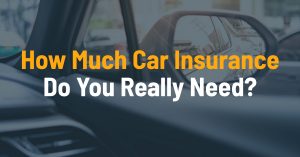
Financial security is a top concern due to the COVID-19 pandemic. About 36.5 million people filed for unemployment over the last eight weeks, as of May 14, 2020. Six out of 10 people are concerned about how they’ll be able to pay their bills, according to a recent survey conducted by Clearcover, a car insurance company.
We’re also driving a lot less. Farmers Insurance saw a 58% reduction in miles driven in the week of March 29 to April 4, compared to the previous week, according to Keith Daly, President of Personal Lines for Farmers. With more than 90% of the U.S. population under stay-at-home orders and our cars sitting in our driveways, many people might be looking at reducing their car insurance costs.
Don’t consider canceling your car insurance altogether, which could be a costly mistake that could expose you to serious financial and legal consequences.
“Look at your budget from a holistic view. I think a lot of people don’t incorporate car insurance into their entire budget, but rather think of it as a separate entity and therefore make the decision to cancel their car insurance,” says, Ariana Gibson, Head of Driver Insights at Clearcover.
Gibson suggests that before making a decision to cancel your car insurance, contact your insurance company to discuss other options, such as payment plans. She says the best insurance agents are the ones who ask how your situation has changed and can help you choose the best options for your budget.
Ask Your Auto Insurance Company For Financial Relief
Since the COVID-19 pandemic started and greatly reduced driving, many car insurance companies have taken steps to help ease their customers’ financial burden. If you’re having difficulties paying your car insurance bill, call your car insurance agent and ask about financial assistance options. Here are some alternatives that might be available.
- Ask about extended grace periods. Typically, if you miss a car insurance payment, your insurance company can cancel your policy in seven to 10 days. Many car insurance companies have extended grace periods for up to 60 days and will not cancel a policy for non-payment. Keep in mind, if you use a longer grace period or skip a payment, your total bill will still accumulate.
- Ask the insurer to waive late fees and penalties. If you missed an auto insurance payment, ask your insurance company to waive fees or penalties.
- Ask for a payment plan. Many insurance companies have urged customers in need of financial relief to contact them to discuss setting up payment plans.
- Ask about extended delivery coverage. If you’re using your personal vehicle to earn extra cash by making deliveries such as food, medicine, and other essential items, you typically need to buy extra insurance. However, some insurance companies have temporarily loosened restrictions to extend coverage to personal auto insurance policies for delivery drivers.
In addition to these repayment options and in response to the COVID-19 pandemic, many insurers are offering some type of car insurance refund.
Ask Your Car Insurance Company For Discounts
Car insurance discounts are one of the best ways to save money, and you may already qualify for some. But you’ll often have to pick up the phone (or virtual chat) to ask for them, especially if you qualify for new ones. Here are a few common discounts:
- Multi-policy discount: This discount applies when you buy car insurance and another type of policy (such as homeowners, renters, condo or life insurance) from the same company. This is also referred to as a “bundling” discount and it’s typically one of the biggest discounts you can grab, often between 5% to 25%.
- Multi-car discount: If you have more than one car insured with the same company, you can usually get a discount between 8% to 25%.
- Car safety discount: This applies to safety equipment like anti-lock brakes, airbags, and daytime running lights. This discount can knock as much as 40% off your bill for medical payments or personal injury protection coverage.
- New car discount: If your car is less than three years old, you might qualify for this discount.
- Anti-theft discount: If your car has anti-theft features, you could get anywhere from about 5% to 25% knocked off your comprehensive auto insurance.
- Good driver discount: If you haven’t had any incidents, like car accidents or moving violations, your car insurance company is likely to reward your safe driving skills. These discounts can range from around 10% to 40%.
- Occupational, alumni associations, and professional organization discounts: Your job and other associations could get you a discount. For example, law enforcement professionals, members of state bar associations, and educators may get special savings.
Keep in mind:
- Discounts vary by state and the insurance company. A discount you see advertised on a TV commercial or website might not be available in your state.
- Discounts can be capped. You might qualify for multiple discounts, but your car insurance company typically limits the total possible discount amount. For example, it might look like you qualify for 75% in discounts, but the actual total could be capped at 20%.
- Discounts may not be automatic. Your insurance company might not know that your car has anti-theft features or that you’re a member of a certain organization. That’s why it’s a good idea to pick up the phone and ask for a discount review.
Ask For a Higher Deductible
A deductible is what you pay out of pocket for a collision or comprehensive car insurance claim. For example, if you have $2,000 in damage from a problem covered by the policy (like a car accident or hail damage) and a $500 deductible, your insurance company would pay $1,500 for repairs ($2,000 – $500 = $1,500).
Deductible amounts generally range between $100 to $2,000. Choosing a higher deductible will lower your car insurance premium. That’s because the insurance company will pay out less if you file a car insurance claim. It also means you’ll pay more if you need to make a claim that has a deductible.
Drop Optional Coverage
If you have an older car, you might want to drop coverage like collision and comprehensive insurance. Nationally, the average cost of collision insurance is $342 per year and the average cost of comprehensive insurance is $153, according to the National Association of Insurance Commissioners.
A good rule of thumb is to look at how much you’re paying for these coverage types compared to the value of your car. The maximum insurance payout you can get is the value of your car if it’s totaled.
For example, if your car is worth $2,000 and you have a $1,000 deductible, the maximum insurance claims payment is $1,000.
Keep in mind, if you have a car loan or lease, the lender or leasing company typically requires collision and comprehensive insurance.
Even if you’re not required to carry these coverage types, it’s a good idea to ask yourself if you could afford to pay out-of-pocket to repair your vehicle or buy a new one if your current car is totaled. If you can’t, it’s probably better to keep these coverage types rather than regretting it later.
Suspending Car Insurance
Suspending car insurance typically refers to temporarily removing coverage.
Suspending auto insurance is an action usually reserved for circumstances in which you will not be using your car at all. An example might be a snowbird who lives in Florida for the winter and the Northeast in the summer. Another example is someone who leaves on military deployment. In these circumstances, they might want to suspend collision and liability coverage, since they wouldn’t be driving the car, but keep comprehensive coverage in case of fire, flooding, vandalism or theft.
A stay-at-home order is different. Your car is most likely with you, meaning you have access to it. You might even decide to drive it to the store or doctor. Your insurance company might not allow you to suspend coverages if you’re staying at home.
If your car insurance company does allow you to suspend coverage, think twice. If you suspend your collision coverage or lower your liability car insurance to only the state-required minimum, you could expose yourself to costly expenses like car repair bills or medical expenses if you injure someone in a car accident.
You should only suspend coverage in rare circumstances. And accidents can happen even if you’re not driving, like a hit-and-run accident while your car is parked, falling tree branches, and car theft.
Canceling Car Insurance
Canceling car insurance should be a last resort. If you drive your vehicle without insurance, not only could you be responsible for property damage and medical expenses, you could also face fines and jail time for driving uninsured.
Even if you know you’re not going to drive your car at all, canceling car insurance is still not a good idea. You won’t have any coverage if something happens while your car sits in the driveway, like fire, vandalism or theft. And you’ll have a “coverage gap,” which insurers see as a higher risk. You’ll pay higher rates when you reinstate the policy or buy from a new company.
“Think about car insurance as paying for your protection from risk,” Gibson says. She adds that while dropping car insurance coverage can provide short-term gains, it could have long-term consequences.



